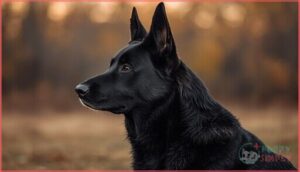This site is supported by our readers. We may earn a commission, at no cost to you, if you purchase through links.
Six to ten percent—that’s all it takes to create something rare enough to ignite obsession. When a solid black German Shepherd puppy appears in a litter, breeders field dozens of calls within hours, and waiting lists stretch months ahead.
That midnight coat isn’t a separate breed or designer variation; it’s a recessive genetic outcome hiding inside the standard German Shepherd bloodline, recognized by every major kennel club yet mysterious enough to command premium prices.
The public sees shadow-dark intensity where experts see identical temperament, structure, and working ability packaged in monochrome elegance. Behind the dramatic appearance lies the same loyal, intelligent companion that’s made German Shepherds a global icon—just dressed for a different audience.
Table Of Contents
- Key Takeaways
- What is a Black German Shepherd?
- Black German Shepherd Appearance
- Temperament and Personality Traits
- Care, Exercise, and Nutrition Needs
- Health Concerns and Lifespan
- Frequently Asked Questions (FAQs)
- Why is my German Shepherd fully black?
- What is the lifespan of a black German Shepherd?
- Is the black color accepted in major kennel clubs?
- Where can I find a black German Shepherd puppy?
- How much does a black German Shepherd cost?
- Are black German Shepherds good with young children?
- Can black German Shepherds live in apartments comfortably?
- Do black German Shepherds get along with other pets?
- Conclusion
Key Takeaways
- Black German Shepherds are purebred dogs with a rare recessive gene (appearing in only 6-10% of litters) that produces a solid black coat, not a separate breed or designer variation, and they’re fully recognized by major kennel clubs like the AKC.
- Despite their striking midnight appearance that makes them look more imposing and protective, black German Shepherds have identical temperament, intelligence, trainability, and working ability as standard-colored German Shepherds.
- These dogs demand serious commitment with 90-120 minutes of daily exercise, frequent grooming (3-4 times weekly due to heavy shedding), and high-protein nutrition (1,200-1,600 calories daily), making them unsuitable for low-maintenance lifestyles.
- Genetic health risks like hip dysplasia, elbow issues, and degenerative myelopathy are common, so preventive vet care and weight management are critical to reaching their 9-13 year lifespan, with lean dogs often living two years longer than overweight ones.
What is a Black German Shepherd?
If you’ve ever seen an all-black German Shepherd, you know they turn heads—but you might be wondering if they’re actually a different breed. The truth is, these striking dogs are purebred German Shepherds with a rare solid black coat that sets them apart from their tan-and-black cousins.
While black is one of the rarer german shepherd colors, it’s completely natural and occurs when both parents carry the recessive black gene.
Let’s break down what makes them official, how they differ from standard German Shepherds, and why they’re so hard to find.
Breed Recognition and Standards
You’ll find solid black German Shepherds fully recognized by major canine breed registries. The AKC, SV, and FCI all list solid black as an accepted color within the official German Shepherd breed standard, alongside sable and bi-color variations.
Registration requirements include:
- Documented pedigree showing purebred German Shepherd lineage from both parents
- Genetic testing confirming recessive black (a/a) rather than dominant black from outside breeds
- Meeting structural conformation criteria identical to other color variations
- Passing health screenings for hips and elbows in working-line programs
- Breed survey evaluations appraising temperament and physical soundness
Unlike disqualified white coats, your black German Shepherd competes under the same breed characteristics and kennel recognition standards as any other color. You may want to review the when considering registration and breed suitability.
Differences From Standard German Shepherds
When you place a black German Shepherd next to a standard black-and-tan, the difference runs deeper than just coat color genetics. That solid black coat comes from two copies of a recessive gene, while standard shepherds carry dominant patterns that create tan points and saddle marks.
| Feature | Black German Shepherd | Standard German Shepherd |
|---|---|---|
| Coat Color | Uniform black from nose to tail | Black and tan, sable, or bi-color patterns |
| Visual Impact | Appears bulkier, hides muscle definition | Lighter areas show angles and structure |
| Public Perception | Often seen as more intense or protective | Generally viewed as more approachable |
The solid black coat can make your dog look more imposing because it hides the visual breaks that reveal muscle and bone structure on patterned dogs. You’ll notice people react differently too—that all-black appearance triggers stronger reactions even though temperament and breed characteristics remain identical.
Both variations shed heavily, but black fur shows up more dramatically on light furniture. Additionally, regular grooming is particularly important for medium-length double coats like those found on black German Shepherds.
Rarity and Popularity
Color genetics explains why you’ll struggle to find a black German Shepherd puppy. Both parents must carry the recessive gene, so only 6 to 10 percent of shepherds are born solid black.
Interestingly, black shepherds can still carry genes for other coat colors, similar to how border collie colors showcase surprising genetic diversity beneath their surface appearance.
That rarity drives intense market demand—breeders report black puppies now top their request lists, commanding premium prices and waitlists stretching months.
Online communities and social media have amplified global demand, making these dogs a niche obsession within an already popular breed standard.
Black German Shepherd Appearance
If you’ve only seen standard-colored German Shepherds, spotting an all-black one feels like witnessing something rare and powerful—because it’s. These dogs carry the same strong, athletic build you’d expect from the breed, but their solid black coat gives them an undeniably striking presence.
Here’s what sets their appearance apart from the pack.
Coat Color and Texture
You’ll notice that Black German Shepherds carry a recessive gene that produces their stunning all-black coat from root to tip. This solid black pigmentation shows no tan or sable markings, creating that dramatic appearance.
Their double-layered coat feels firm yet springy, with glossy guard hairs that reflect light beautifully. Expect seasonal shedding patterns, especially during spring and fall coat changes.
Physical Build and Size
These dogs stand as powerful athletes, with males usually reaching 24 to 26 inches tall and weighing 65 to 90 pounds, while females measure 22 to 24 inches and weigh 50 to 70 pounds.
Your Black German Shepherd’s body proportions reveal:
- A slightly longer trunk than height, giving them balanced movement
- Deep chest depth at 45 to 48 percent of shoulder height
- Strongly muscled shoulders, back, and thighs supporting their working heritage
- Growth patterns that reach adult height around 10 to 18 months, then fill out until age three
Distinctive Features
Your Black German Shepherd’s wedge-shaped head and upright ears create a bold, intense expression intensified by the uniform black coat. Dark brown eyes against a black face produce that signature piercing gaze, while their bushy tail and continuous dark outline form a striking silhouette.
This intelligent breed’s solid appearance stems from a recessive gene producing uniform color from nose to tail tip.
Temperament and Personality Traits
Black German Shepherds have a personality that runs deeper than their striking looks—they’re known for unwavering loyalty and a protective instinct that makes them natural guardians.
Their sharp intelligence sets them apart as one of the most trainable breeds you’ll find, whether you’re teaching basic commands or complex work.
Understanding how they interact with families and respond to social situations will help you decide if this bold, devoted companion fits your lifestyle.
Loyalty and Protectiveness
When your world feels uncertain, this intelligent breed steps in as both shield and shadow. Their loyal nature runs deeper than simple obedience—you’re looking at a living guardian who learns your rhythm and stands watch without being asked.
A Black German Shepherd becomes your living guardian, learning your rhythm and standing watch with loyalty that runs deeper than obedience
- They form strongest bonds with the person who feeds, trains, and spends daily time with them
- Their protective instincts kick in fast when they sense genuine threats to family members
- Territorial behavior shows up naturally around home, yard, and vehicle boundaries
- Family loyalty extends to the entire household, with many rotating between members throughout the day
- Guardian traits include staying composed in tense situations and using graded warning responses with strangers
Trainability and Intelligence
You’re working with one of the sharpest minds in the canine world—these intelligent dogs rank in the top three breeds for obedience training and problem solving.
Their trainability shines through quick command mastery, often learning basics in just a few sessions. Intelligence levels stay sharp with daily mental stimulation like scent games and trick training.
Loyalty fuels their eagerness to please, making dog training feel like partnership rather than work.
Family and Social Behavior
Your loyal companion often picks one favorite person while staying affectionate toward everyone—you’ll find them trailing you room to room like a shadow.
Early socialization tips include calm stranger introductions and supervised play with children to maintain household harmony. Their pack behavior means they view kids as family members worth protecting, making them devoted family pets when raised with clear boundaries and consistent canine interaction training.
Care, Exercise, and Nutrition Needs
Owning a Black German Shepherd means committing to their physical and mental needs—these aren’t low-maintenance dogs.
From brushing that thick double coat to fueling their active lifestyle with the right nutrition, you’ll need to stay on top of several care essentials.
Here’s what your dog will need to thrive.
Grooming and Coat Maintenance
Your Black German Shepherd’s dense double coat demands attention—think of grooming as essential armor maintenance, not optional pampering.
Here’s your approach:
- Brush 3-4 times weekly using deshedding tools like undercoat rakes to control shedding and prevent matting
- Bathe every 2-4 months to preserve natural oils
- Schedule professional grooming every 8-12 weeks
- Supplement omega-3s for coat conditioning and shine
Daily Exercise Requirements
A well-groomed coat won’t matter if your dog’s bouncing off the walls. Adult Black German Shepherds need 90 to 120 minutes of daily exercise to stay balanced—split morning walks with evening play sessions. Don’t just tire the body; challenge that razor-sharp mind with training drills and puzzle toys.
Age adjustments matter—puppies need protected joints, seniors need gentler pacing. Watch for limping or heavy panting as your cue to dial back intensity and protect long-term health.
| Life Stage | Duration | Activity Type |
|---|---|---|
| Puppy | 5 min/month of age, 2x daily | Short walks, gentle play |
| Adult | 90-120 minutes | Brisk walks, fetch, agility |
| Senior | 30-60 minutes | Low-impact walks, swimming |
| High-Energy Adult | 2 hours+ | Running, dog sports, tracking |
| Recovery/Injury | Varies | Gentle walks, hydrotherapy |
Recommended Diet and Nutrition
You just burned calories on that walk—now let’s refuel properly. Your adult Black German Shepherd needs 1,200 to 1,600 calories daily, split into two meals for stable energy. Aim for 20 to 25 percent protein and 8 to 15 percent fat to support muscle and activity.
Watch for food allergies—chicken or beef can trigger itchy skin in sensitive dogs, so consider lamb or fish alternatives.
Health Concerns and Lifespan
Black German Shepherds are strong, capable dogs, but like all large breeds, they face certain health challenges you should know about before bringing one home.
Understanding their common genetic issues and what preventive care looks like can help you give your dog the best shot at a long, active life.
Here’s what to watch for and how to keep your black German Shepherd thriving for years to come.
Common Genetic Health Issues
Like all breeds shaped by human hands, your Black German Shepherd carries genetic baggage along with that stunning coat. Hip dysplasia and elbow issues top the list, often causing pain as joints wear down.
Degenerative myelopathy can steal your dog’s hind-leg coordination, while pancreatic disorders and bleeding disorders lurk in some bloodlines. Understanding canine genetics helps you spot warning signs early and give your companion the best shot at wellness.
Preventive Care and Regular Checkups
Staying ahead of those genetic threats means partnering with a vet who knows the breed. Annual exams catch joint trouble and organ changes before they steal your dog’s joy.
Vaccine schedules, parasite control, and dental hygiene form your frontline defense, while wellness plans customized to your Black German Shepherd’s age keep joint health and overall canine health and wellness on track.
Expected Lifespan and Quality of Life
Most Black German Shepherds reach 9 to 13 years, though lifespan factors like genetics, weight control, and consistent Senior Care shift those numbers. Lean dogs often gain two extra years compared with overweight littermates—a huge win when Mortality Rates climb around age 10.
Quality dog health and nutrition, steady exercise, and proactive animal health and wellness planning let your companion enjoy strong muscles, sharp focus, and genuine joy through the Aging Process.
Frequently Asked Questions (FAQs)
Why is my German Shepherd fully black?
Your German Shepherd is fully black because it inherited two recessive genes at the agouti locus from both parents, producing a solid black coat—a rare but natural variation within the purebred breed standard.
What is the lifespan of a black German Shepherd?
You can expect your dog to live 9 to 13 years on average. Genetic factors, health screening, and senior care all influence longevity.
Lifestyle choices help Black German Shepherds reach their full potential.
Is the black color accepted in major kennel clubs?
Yes—don’t let anyone shepherd you wrong. Solid black coats are fully accepted and show-eligible in major kennel clubs, as the AKC, FCI, and UKC all list “black” on their official breed standard color charts.
Where can I find a black German Shepherd puppy?
You can find black German Shepherd puppies through reputable breeders like Lick Creek or Schwarzer Hund, rescue options such as All Shepherd Rescue, the AKC Marketplace with breeder reviews, or regional adoption listings.
How much does a black German Shepherd cost?
Most black German Shepherd puppy prices land between $1,500 and $2,500 from reputable breeders, though champion bloodlines push costs toward $4, Adoption through rescues usually runs $100 to $400, making rescue a budget-friendly alternative.
Are black German Shepherds good with young children?
When properly socialized and trained, these loyal dogs often thrive as family pets and companions, showing a gentle, protective nature around kids.
However, constant parental guidance, child safety tips, and early socialization techniques remain essential.
Can black German Shepherds live in apartments comfortably?
With enough daily exercise and owner commitment, these dogs can adapt to apartment living. Space requirements include room to move, and noise control matters when neighbors are close by.
Do black German Shepherds get along with other pets?
With consistent socialization tips and proper prey drive management, most of these canine companions adapt well to multi-pet homes. However, their strong protective instincts require structured canine introduction strategies for success.
Conclusion
Picture that midnight silhouette standing alert in your doorway—muscles coiled, ears forward, loyalty radiating from every angle. That’s the black German Shepherd experience distilled to its essence.
You’re not choosing a different breed; you’re selecting identical devotion wrapped in rarer packaging. The training commitment stays steep, the exercise demands remain non-negotiable, and the protective instinct runs just as deep. What changes is simply how many heads turn when you walk past.
- https://wustenbergerland.com/black-german-shepherd/
- https://petventuresbook.com/blogs/blog/black-german-shepherd-the-ultimate-breed-guide
- https://vagsd.com/dominant-black-german-shepherd/
- https://spiritdogtraining.com/breeds/black-german-shepherd/
- https://www.ufaw.org.uk/dogs/german-shepherd-hip-dysplasia













